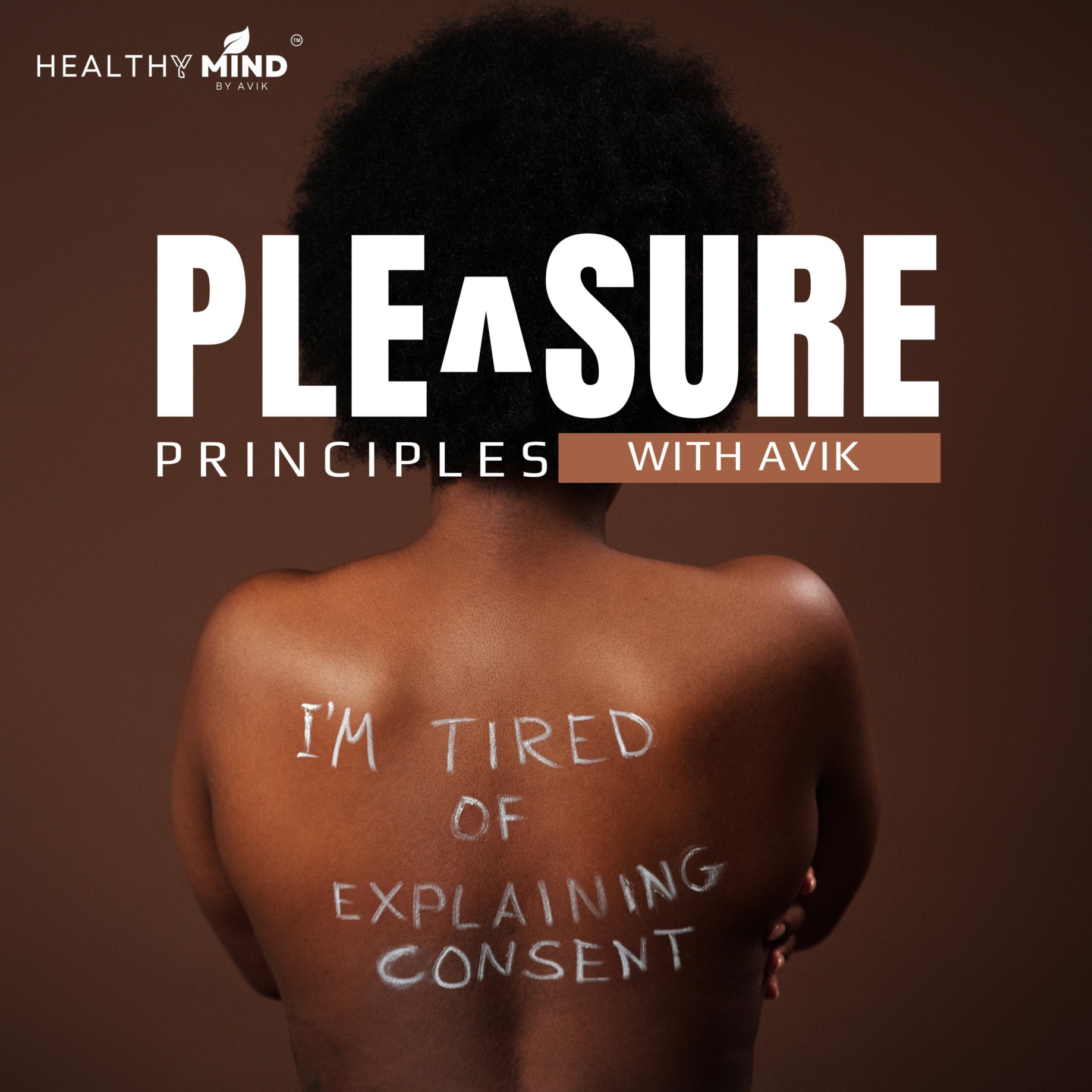
Mind Over Masculinity
Let’s stop asking men to "man up" and start asking how we can lift them up. After all, mental health is not just a women’s issue or a men’s issue—it’s a human issue.
Take the first step today. Talk, listen, and advocate. Together, we can make a difference.
Mind Over Masculinity
Redefining Masculinity: Embracing Spiritual Growth and Vulnerability for Personal Transformation and Authenticity with Anastasia Gerali
Unlock the key to redefining masculinity with our special guest, Anastasia Gerali, the mastermind behind Rapid Alignment Therapy. Anastasia joins us to unpack the intricate layers of masculinity in today's society. Together, we dissect how a harmonious balance between masculine and feminine energies is essential for personal and relational well-being. We delve into how trauma, firmly rooted in formative experiences, shapes men's perceptions and expressions of masculinity. Anastasia’s innovative approach combines somatic and emotional healing with psycho-spiritual alignment, offering listeners revolutionary insights into achieving healthy masculinity.
Journey into the realm of spiritual masculinity and vulnerability as we challenge the restrictive societal norms preventing men from expressing their true selves. Discover how integrating spiritual frameworks with psychological practices can elevate consciousness, creating empowered and authentic identities. Anastasia and I emphasize the importance of safe spaces, like men's circles, for genuine emotional expression, and highlight key differences in how men and women process emotions. We also share transformative tools from Anastasia's free three-day soul manifestation event, designed to break outdated patterns and foster more fulfilling relationships and communities. Embrace this opportunity to evolve and grow with us.
Automate Social Media Post
Make Short Clips From Long Videos
Loved by 4M+ marketers, entrepreneurs & creators
Create and translate videos
Create and translate videos with HeyGen's AI Video Generator
Buzzsprout Podcasting
Disclaimer: This post contains affiliate links. If you make a purchase, I may receive a commission at no extra cost to you.
-----------------------------------------------------------------------------------------------------------------
Want to be a guest on Mind Over Masculinity? Send me a message.
-----------------------------------------------------------------------------------------------------------------
Stay Tuned And Follow Us!
- YouTube - https://www.youtube.com/@healthymind-healthylife
- Instagram - https://www.instagram.com/podhealth.club/
- Threads - https://www.threads.net/@podhealth.club
- Facebook - https://www.facebook.com/podcast.healthymind
- LinkedIn - https://www.linkedin.com/in/newandnew/
I'm going to show you how to make a beautiful, beautiful, beautiful, beautiful, beautiful, beautiful, beautiful, beautiful, beautiful, beautiful, beautiful, beautiful, beautiful, beautiful, beautiful, beautiful, beautiful, beautiful, beautiful, beautiful, beautiful, beautiful, beautiful, beautiful, beautiful, beautiful, beautiful, beautiful, beautiful, beautiful, beautiful, beautiful, beautiful, beautiful, beautiful, beautiful, beautiful, beautiful, beautiful, beautiful, beautiful, beautiful, beautiful, beautiful, beautiful, beautiful, beautiful, beautiful, beautiful, beautiful, beautiful, beautiful, beautiful, beautiful, beautiful, beautiful, beautiful, beautiful. Thank you. So so Welcome listeners to Mind Over Masculinity, the podcast where we explore the evolving landscape of masculinity, delving deep into the challenges, triumphs and transformations of modern men. I'm your host, Sana, and today we are diving into a very thought-provoking topic the epidemic modern men are facing.
Speaker 1:Masculinity under attack, and our guest today is the remarkable Anastasia Turali, creator of Rapid Alignment Therapy, an innovative modality combining somatic and emotional healing, psycho-spiritual alignment and also brain repatterning. Listeners, anastasia's mission is to help individuals heal deeply and permanently while aligning with their highest potential. Her work with the feminine psychology and trauma healing offers a unique perspective that can help us understand the challenges modern men face in redefining masculinity in a rapidly changing world changing world. So everyone, get ready for a very rich conversation that will challenge perspectives and spark meaningful dialogue. Anastasia, welcome to the show and, as always, it's an absolute pleasure having you with us today.
Speaker 2:Thank you, Sana. I'm so happy to be here with you again.
Speaker 1:You know you have worked extensively with feminine psychology and trauma healing. So from your perspective, anastasia, what are the core challenges modern men are facing when it comes to understanding and expressing their masculinity?
Speaker 2:Yeah, thank you so much for allowing me to come in and share my perspective, because, yes, while I do, my work does focus on working with women and feminine psychology. In order for the feminine to rise, the masculine also needs to rise, and that is part of the responsibility of us as women to assist that. To assist that. I do not agree with this modern attack or modern feminist attack on masculinity, where we are trying to rise by tearing another down, and I find that many, many men are suffering and many relationships are suffering as a result of this fight for equality.
Speaker 1:Yeah, yeah, I totally, totally agree with your perspective and I think it's a high time to address this and, you know, create an awareness around this. You know before, uh, the dynamics, the balance is completely is gone. At the dynamics, they completely crash. So the concept of masculinity it has evolved significantly over time. So how do you define healthy masculinity in today's cultural and social context?
Speaker 2:Yeah, that's a great question. While the concept has evolved, or shall we say the role of men and women have evolved, masculinity in its essence hasn't really changed. It is something that is innate, and I work with polarity. So when we talk about polarity, we're talking about masculine and feminine polarity, which we all have inside us. Women have masculine energy, men have feminine energy as well, and then, of course, there's four quadrants to this. There's the light, masculine and feminine, and the dark, masculine and feminine, and we need to have a beautiful, healthy balance and expression of all of these quadrants in order for us to find and to create harmony within ourselves and within our relationships.
Speaker 2:So, when we're speaking about masculine traits, we are speaking about presence, we are speaking about provision, protection, we are speaking about leadership, and you can see how some of these are applicable to women as well. Women can be phenomenal leaders as well. Women are fierce protectors, especially when it comes to being parents and mothers. And then the light masculine traits or qualities are stillness, are presence. The feminine qualities are playfulness, the light feminine quality, playfulness, creativity. So we can find these in men as well. We would like our men to be able to be creative as well, or allowed to be creative and the dark. I'm just giving some of the top notes of really a much, much bigger conversation.
Speaker 2:The dark feminine qualities are rage, chaos, and when we talk about the dark qualities, people often misunderstand them. People think that they are bad or negative. And they're only bad, quote unquote, when we haven't properly mastered expressing them and we haven't made space for expressing them. For example, a dark masculine trait would be aggression, but when it's healthily expressed, it's assertiveness, and assertiveness is good and healthy and that's a quality that we want in someone who is a leader. Assertiveness is also good when we're talking about boundaries, being able to say no and not bending on that. A wounded masculine trait, for example, would be people-pleasing. We can find that in men and women.
Speaker 1:Yeah, yeah, I agree Also. You often talk about healing trauma as a pathway to alignment. So how does unresolved trauma manifest differently in men and how can addressing it reshape their relationship with masculinity?
Speaker 2:Unhealed trauma is when we're speaking about how it manifests differently in men. It really depends on their upbringing, Because whenever we're talking about trauma, we're talking about the formative years, zero to seven. Initially, those are the foundational years that would have created your character, your personality, so to speak. So it has everything to do with the relationship that both men and women would have had with their parents, meaning their primary role models for the masculine and the feminine. And very often, if the father is not present or if the father is emotionally unavailable, or if the father is emotionally unavailable, that would have been selected as a partner by a mother who was raised with that type of father. So we can see how ancestral and generational trauma repeats itself in our unconscious choices.
Speaker 2:And that mother would have unconsciously raised her son to be the type of man which she lacks or which she misses in her life especially in the West, would be much more feminine if he was raised by a mother that was over-masculinized and therefore raised her son to be the type of man that she needed to balance her out. Which is again how we're repeating young women having to be more masculine because men are more feminine and they're not more feminine because they are not masculine enough. It has to do with their grooming from their childhood years. So all of this is completely done unintentionally and unconsciously, but we can see how these cycles repeat themselves generation to generation and it does take someone to wake up to this pattern and say you know what?
Speaker 2:I want my relationship to feel different. I want to feel different. I want to feel different. I want to feel different. I want to communicate differently. As a man, as a leader, I don't want to feel like I'm always people pleasing and I'm tiptoeing around my partner or around my boss, because this will impact you professionally as well as privately.
Speaker 1:Also, many believe that masculinity is under attack in today's society. Do you think these cultural shifts are forcing men to re-evaluate their roles, and is that necessarily a bad thing?
Speaker 2:I am one of the people that believes that masculinity is under attack.
Speaker 2:I see, even modern feminism is really a guise or a masked version of the patriarchy, particularly when we're talking about non-binary or transgender women now competing in women's categories.
Speaker 2:But these transgender women were born men, biological men, so of course they have an advantage and I don't see the feminists speaking up about this, because they fought so hard for equality that now it almost seems hypocritical to want men to stand up for us and men to protect us and to say no to transgender athletes or transgender people competing in women's categories. So the roles are just completely dissolving and distorting. And whereas women's programming really has to do that, their value is attached to or linked to their youth and their beauty, which is why we see so many women desperately trying to appear, you know, 25 forever and not really allow themselves to grow and evolve as a woman who matures through the years and through her phases. Men's programming has been that their value is attached to their monetary achievements, is attached to their monetary achievements, which is why men have been chasing this material status and perhaps not properly evolved emotionally and spiritually.
Speaker 2:Yeah, makes sense yeah, makes sense and yeah, and as, as, as women who want our, our men to be the providers and protectors, I think there's something really beautiful in these traditional roles, um, but also have your equal polar opposite.
Speaker 2:It's really our duty to encourage and create safe spaces for men to be able to express themselves, because we can't expect a man to be, you know, a leader and a provider and a protector and then complain about him being emotionally unavailable when we don't create a space for him to be able to, when we don't create a space for him to be able to express himself emotionally, creatively, mentally, and, I think, men finding those spaces with other men as well, the normalization of men supporting each other, not just on a mental, on a cognitive level, but also emotionally, and allowing themselves to reprogram their role or their relationship with other men, with father figures, with brother figures. There's something really beautiful when men come together to heal, in the same way that it happens when women come together, but women naturally, women naturally have those relationships with their female friendships, whereas men don't necessarily have those emotionally safe relationships with other men.
Speaker 1:Also, some argue that I don't believe in this. But still, on the flip side, the narrative of masculinity under attack is overstated and detracts from the progress being made in gender equality. How would you respond to critics who feel that framing masculinity under attack is counterproductive?
Speaker 2:I think, you know, men have been villainized and this argument in itself is completely invalid, because it's a little bit like saying, you know, only minorities matter. And I feel like if we're saying only minorities matter, then we don't really care about the majority. So what we're doing is we're dropping the standard for the majority so that we can raise a standard for a minority, whereas that's not really how society tends to go forward. Society tends to raise their standards to the highest average, which is what we want, particularly. You know, I to an extent agree that we can stop talking about this and just be more supportive of each other, and I think that these labels don't really serve us. These labels sometimes are used as a weapon, particularly by minority groups. So I don't believe that we are moving forward as a society if we are minimizing the needs of men in the modern day.
Speaker 1:Makes sense, makes sense, makes sense, makes sense also. Uh, your approach indicates spiritual frameworks with psychological practices. So how can faith and spirituality help men reconnect with a balanced and empowered sense of self?
Speaker 2:A spiritual man or a man that has a spiritual practice is someone who is just so much wiser, beyond just the physical and the practical. This is, you know, the thing that we love about our men is that they are physical, that they are practical, but it's this spiritual connection that he has with himself and with the higher power that allows him to really be able to meet his partner and meet himself at a higher level of consciousness. And a man that has a higher level of consciousness is absolutely limitless. We again, as I said before, we don't want to minimize men to just like the bare basics. We want to elevate our men in the same way that women want to elevate themselves in the world mentally, spiritually, financially. We want the same for our men. So a spiritual practice is extremely grounding for a man, but it's also very elevating on a mental level and on a wisdom level absolutely, and you know societal expectations of men.
Speaker 1:They often create pressure to conform to traditional rules or suppress emotions, and I think the most dangerous part is, uh, while we have been very openly advocating for transforming that, you know societal expectations around feminism. Then, okay, women are not supposed to conform to the traditional. You know roles or rules created by the societies but nobody talks about. You know men men are supposed to not cry or express their feelings or become vulnerable or weak. You know it's expected to man up and be strong, irrespective of any situation. So how can we as a society encourage men to embrace vulnerability without fear of judgment?
Speaker 2:yes, thank you so much for this question. It's a very loaded question and this is where I just talk about normalizing men's circles and men's spaces held by other men. Obviously, we don't want to move forward in a society where we want everybody to have temper tantrums and break down in the middle of the day just anywhere, because that's not appropriate and that's not what adults do. But being able to have that space where it's normal and it's healthy for a man to have an outlet, to be able to speak about the pressures that he faces and the pressures that he's under the thing with how we express men and women and this is down to the masculine and the feminine archetypes we really do express very differently. So, whereas women are very verbal, you know women we love to get together with our girlfriends and complain about everything and we're not even really looking for an answer. We don't need an answer, we just need to express and we need to be heard and be witnessed by another person, and that in itself is therapeutic for us. Men don't have that same desire. Which is where this miscommunication happens between partners is that men will shut down while they are processing, so they will go into their man cave and analyze and process, and when they are ready to share, that is when they will come out and they will discuss it with a suitable person. So this is why I really do believe that men's circles are so beautiful and so healthy.
Speaker 2:And it's not just for men to sit in circles and cry or dance the way that women would.
Speaker 2:Maybe it's even just to come together with another man and chop wood and carry water, do physically hard things, and that in itself is therapeutic. For a man to have that physical outlet really is meditative for his emotional health as well. So we don't want everybody to go up into our cognitive mind and just live from our emotions constantly because things need to get done. So when you know you use the term man up I would say the same for women women up you know there's times that you need to pick up your socks and you need to move on and not become consumed by what it is that you're currently processing. If you have the tools to process and you have a safe space and a safe environment whether that be with a professional or that be with a community where you can healthily express and process everything that you are going through, then that's not something that needs to overwhelm or burden other areas of your life. This is how we create functional, high functioning, not survival functioning societies and communities and relationships as a result true, true, true.
Speaker 1:Beautifully said, anastasia. So, of course, if our listeners, they would like to connect with you and explore more and more insights about masculinity in today's modern age, how they can do that.
Speaker 2:Well, I wouldn't necessarily be the best place for that because, as I said, I do specialize in feminine psychology. I do work with couples, however, and I have an incredible modality, which is called the rapid alignment therapy, which is accessible to absolutely everybody, and everybody needs to learn these tools and master these tools. I would recommend following me on Instagram and also clicking to find my three-day soul manifestation code event, so that's where I will share. It's a free event and I've made it free so that absolutely everybody can do the three days with me, so that you can learn some incredible tools that will help you to process your trauma and your triggers and dissolve them, so that you can move forward from a place of freedom, from a place of alignment, rather than be triggered into old, outdated programs and patterns that are just creating outdated results. We don't need to keep repeating things. We get to spiral up, not spiral downwards.
Speaker 1:Absolutely true. Anyway, I mean, it will be a great place to start. Irrespective of, you know, men or women, I think, as a human, it's a great place to start trauma healing, and, you know, with your own anesthesia definitely. So I would encourage all of our listeners to check out the show notes and connect with anesthesia. Follow her on Instagram and anesthesia. Thank you so much for your insights, for joining us today and sharing your incredible insights on such a timely and complex topic. Thank you, Thank you.
Speaker 2:Thank you so much, sana, and thank you so much for starting this podcast. I'm really excited to see some of the guests that you're going to be inviting on here in the future as well. Absolutely.
Speaker 1:So, listeners, thank you to all of you for tuning in to Mind Over Masculinity and be a part of this conversation. If you found value in today's episode, please subscribe, share and leave a review. And remember that evolving masculinity isn't just a challenge. It is an opportunity for all of us to grow together. And until next time I'm your host, sana. This is mind over masculinity. Stay curious and stay courageous.







